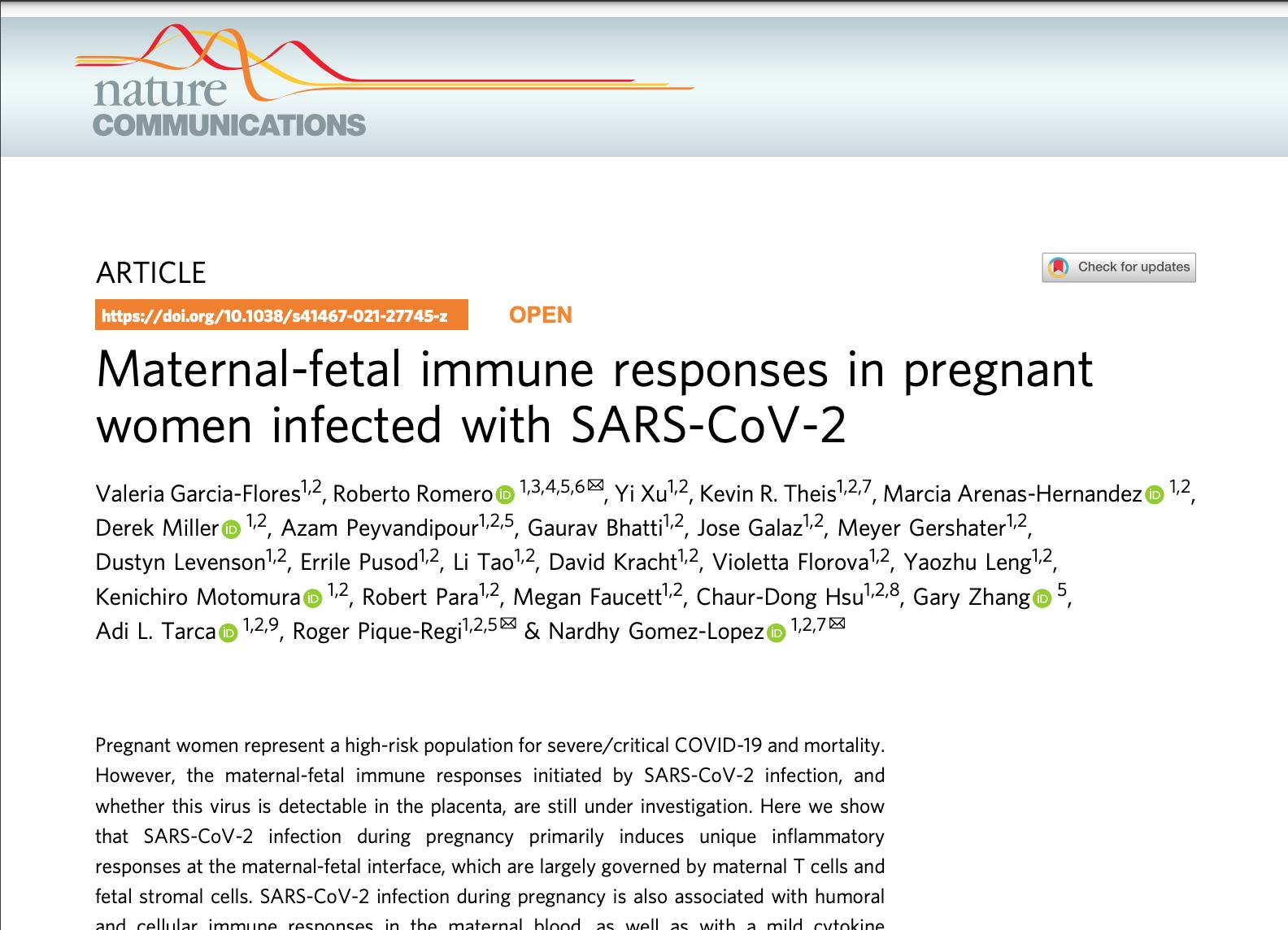The Paper's reporter Feng Yinlun

Research paper "Evaluating the Immune Response to COVID-19 Infection During Pregnancy" published in the academic journal Nature Communications
Recently, the academic journal Nature Communications published a paper titled "Maternal-fetal immune responses in pregnant."
women infected with SARS-CoV-2) "claims that exposure to the new coronavirus during pregnancy causes an inflammatory response in the placenta involving both maternal and fetal cells, but does not infect placental tissue." Researchers believe that the placenta protects the fetus from infection.
According to another study, after pregnant women are vaccinated against the new crown, antibodies can pass through the placenta of pregnant women with new crown pneumonia diseases, and newborns have protective antibodies after birth. Recently, WHO Director-General Tedros Adhanom Ghebreyesus has recommended the inclusion of pregnant women in treatments and clinical trials of COVID-19 vaccines.
The placenta protects the fetus from viral infections
Researchers at the National Institutes of Health (NIH) conducted and completed the study at the Eunice Kennedy Shriver National Institute of Child Health and Human Development (NICHD), an institute affiliated with the National Institutes of Health.
The study enrolled 11 healthy pregnant women and 12 pregnant women who tested positive for COVID-19. Among the infected people, 8 were asymptomatic, 1 was mildly ill, and 3 were severely ill who needed oxygen.
The study detailed changes in antibodies, immune cell types, and inflammatory markers in maternal blood, cord blood, and placental tissue.
According to the study, a very specific "pro-inflammatory immune response" was observed in the placenta after exposure in the maternal virus, in the blood of the mother and fetus.
The study found that although pregnant women were infected with the new crown virus in different severities, they all produced antibodies against the virus, some of which were found in cord blood; their bodies had a decrease in T cells, which helped drive the antiviral response; and the levels of immune activity markers (i.e., cytokines) in the blood were increased, including interleukin-8, interleukin-15, and interleukin-10.
Interleukin, referred to as interleukin, plays an important role in transmitting information, activating and regulating immune cells, mediating T and B cell activation, proliferation and differentiation, and inflammatory response.
The study also found that neither fetal antibodies nor the coronavirus were found in the placenta – indicating that the placenta protects the fetus from infection, but that the immune activity in the baby's placenta and cord blood has changed, and there has been an inflammatory response, such as an increase in the level of interleukin-8. This means that the fetus's immune system is affected to some extent by the mother.
The team notes that the findings improve understanding of the maternal-fetal immune response after infection with the new coronavirus and suggest that vertical transmission from mother to fetus "can be extremely rare."
Maternal blood, infant cord blood, and cytokine responses of pregnant women infected with the new coronavirus
However, due to the limited number of pregnant women infected with severe COVID-19 in the study, the researchers also cautioned that the above conclusions should be interpreted with caution.
Pregnant women are advised to be vaccinated against COVID-19
Recently, a research paper published in jama Pediatrics, a well-known pediatric journal in the United States, pointed out that pregnant women infected with the new crown virus can transfer antibodies to the fetus. This means that pregnant women are vaccinated against COVID-19 and newborns are born with protective antibodies.
The study collected data from thousands of blood samples from pregnant women and newborns.
Dr. Scott Hensley, associate professor of microbiology at perelman School of Medicine in Pennsylvania and ph.D. of the Pennsylvania Institute of Immunology, said that antibodies against the new crown virus can pass through the placenta of pregnant women with new crown pneumonia, including antibodies for asymptomatic infected people. The concentration of antibodies in the blood of newborns is similar to or even higher than that in the mother's blood. Pregnant women who contract the virus in the early stages of pregnancy deliver more antibodies than pregnant women who are infected in the third trimester.
The results of a report released in Singapore in December 2020 also showed that the children of five people infected with the new crown virus had antibodies against the virus in their bodies as soon as they were born.
A recent study by the National Institutes of Health pointed out that compared with ordinary people, pregnant women with new crown pneumonia have higher rates of severe illness and mortality, and further protective measures need to be strengthened. If antibodies are formed to provide immunity to the newborn, it will once again prove the need for vaccination.
On January 18, local time, the European Medicines Agency (EMA) released a message saying that after studying about 65,000 pregnant women at different stages of pregnancy, it was found that there was no indication that the mRNA vaccine would increase the risk of pregnancy complications, miscarriage, premature birth, etc. "The benefits of vaccination far exceed any risks that may occur."
An internal team at the agency also said that the COVID-19 vaccine can also provide further protection for pregnant women, reducing the probability of severe COVID-19 hospitalization and death, especially in the third trimester.
Currently, both WHO and the US Centers for Disease Control and Prevention (CDC) say pregnant women should be considered against COVID-19.
WHO Director-General Tedros Adhanom Ghebreyesus said on January 12 that pregnant women are not at higher risk of contracting the new crown virus, but if infected, the risk of developing severe disease will be higher, and recommended that pregnant women be included in clinical trials of treatments and new crown vaccines.
Responsible editor: Tang Yubing Photo editor: Shi Jiahui
Proofreader: Liu Wei